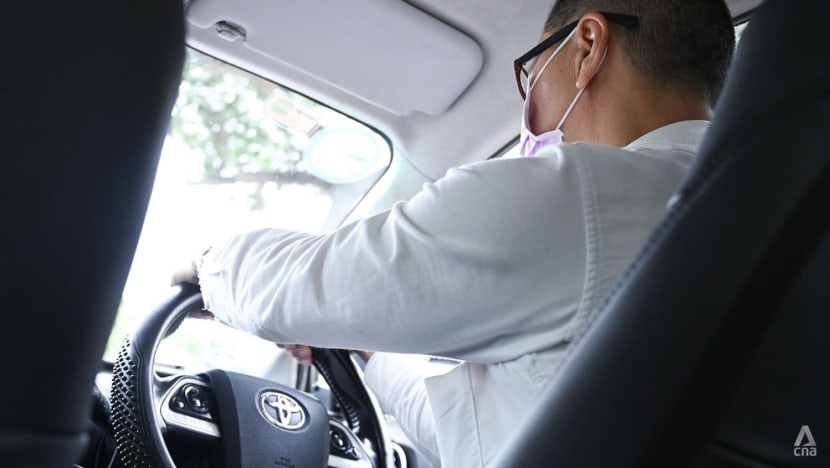Creating new COE category for private-hire cars will drive up costs for consumers: Transport Ministry

A Grab driver wearing a mask in his vehicle. (Photo: CNA/Gaya Chandramohan)
SINGAPORE: Removing private-hire cars (PHC) from the usual Certificate of Entitlement (COE) bidding pool will ultimately drive up costs for consumers, Senior Minister of State for Transport Amy Khor told Parliament on Tuesday (Sep 13).
"Removing PHCs from the bidding pool and creating a new category with specific requirements, such as a minimum number of trips to prevent abuse would be difficult to enforce and adds to the compliance cost for PHC operators, drivers and ultimately consumers," she said.
She also said that the PHC companies have not submitted COE bids with reserve prices higher than non-PHC companies.
Dr Khor was responding to a question by MP Louis Chua (WP-Sengkang), who asked whether car rental companies, particularly those leasing to PHC companies, have affected COE bid prices in the past year.
The COE premium for larger cars in Category B hit a second consecutive record in the latest bidding exercise on Sep 7, as prices closed higher for most categories.
COE premiums have been on a largely upward trend and broken record highs in the past few months, with observers attributing this to a lack of COE supply.
Some netizens have blamed the eye-watering prices on PHC and rental companies, arguing that they should be removed from the COE bidding process, similar to taxi operators. PHC and rental companies earlier told CNA they did not bid aggressively for COEs and were not responsible for the rise in premiums.
Dr Khor said on Tuesday that "there is no evidence" PHC companies caused the increase in COE bid prices.
"LTA (Land Transport Authority) has been monitoring the market closely and over the past year. The demand for COEs from PHC companies as well as the overall PHC population have been stable," she said.
Since 2012, taxi operators do not have to bid for a COE to register their taxis. Instead, they draw from the pool of Category E (Open) COEs and pay the Category A COE prevailing quota premium.
Taxi availability standards were also introduced, and taxi operators can grow their fleets by up to 2 per cent per annum, subject to meeting the standards, Dr Khor said.
"Unlike taxis, PHCs are essentially privately owned cars that have the flexibility and autonomy to take passengers, thereby augmenting our supply of shared point-to-point vehicles," she added.
"Hence, PHCs are treated like privately owned cars under the vehicle quota system."
Dr Khor said the call to review COE categories is a "perennial suggestion", highlighting that there will be trade-offs between having specific categories to meet specific requirements and ensuring sufficient COE quota for those categories.
"The fact is that it is going to lead to further fragmentation and volatility, particularly when COE supply is low," she said.
"So, if you're looking at COE premiums and so on, basically it's fundamentally demand and supply for vehicles that determines COE premiums."
Dr Khor added that LTA will continue to monitor the point-to-point sector and study schemes for further enhancement.
















